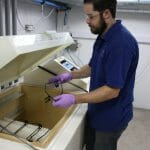Uniqsis announces its PhotoSyn™ high-power photoreactor light module for continuous flow chemistry is now available with alternative LED array configurations that makes it compatible with a broader range of photochemical reactions.
The availability of 3 new alternative switchable LED configurations (Blue, UVA-Blue and Blue-Green-White) provides chemists with the unique ability to optimally undertake almost any photochemistry reaction. The operating wavelengths of the 3 LED array configurations are Blue (455nm), Blue-green-white (455nm, 530nm and 420-700nm) and UVA-blue (365nm and 455nm).
The curved, water-cooled LED arrays in the PhotoSyn™ are designed to maximise photon intensity and concentrate the available light on the independently temperature controlled central coil reactor. These high-quality LED’s have lifetimes of several years in continuous use without suffering a significant reduction in intensities.
The PhotoSyn™ incorporates a cooling fan to minimise undesirable radiative heating of the flow reactor whilst being cleverly engineered to completely prevent potentially hazardous light emissions from the unit, thereby avoiding the need to operate the instrument in a shielded enclosure. Moreover, the PhotoSyn™ is protected with safety interlocks that deactivate the light source and protect the user if any attempt is made to remove the cover whilst in use.
The PhotoSyn™ is compatible with both the Uniqsis Cold Coil™ standalone reactor module and the Polar Bear Plus Flow™ cryogenic flow reactor, which control the coil reactor temperature independently of the lamps. Reactions may be run from 150°C down to sub-ambient temperatures dependent upon the power of the cooling unit used. The variable power supply allows the lamp power output to be adjusted from 10-100% making the unit suitable for both small scale R&D and scale up applications.
For further information on PhotoSyn™ please visit www.uniqsis.com or contact Uniqsis on +44-845-864-7747 / [email protected]. To download a report describing a customer evaluation of the PhotoSyn please visit https://www.uniqsis.com/fcPublications.aspx#2109 (select publication 62).
Since 2007, Uniqsis has specialised in the design and supply of mesoscale continuous flow chemistry systems for a wide range of applications in chemical and pharmaceutical research. The company’s aim is to make flow chemistry easily accessible to both novices and experienced users.
———————
Further Information:
Uniqsis Ltd
29 Station Road
Shepreth
Cambridgeshire CB7 5RJ
UK
tel: +44-845-864-7747
email: [email protected]
web: www.uniqsis.com







